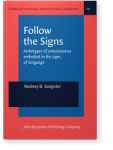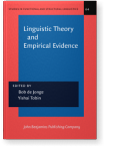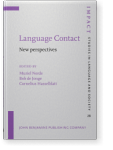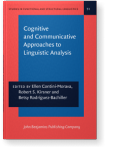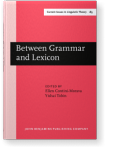Bob de Jonge
List of John Benjamins publications for which Bob de Jonge plays a role.
Book series
Titles
Linguistic Theory and Empirical Evidence
Edited by Bob de Jonge and Yishai Tobin
[Studies in Functional and Structural Linguistics, 64] 2011. vi, 299 pp.
Subjects Functional linguistics | Phonology | Syntax | Theoretical linguistics
Language Contact: New perspectives
Edited by Muriel Norde, Bob de Jonge and Cornelius Hasselblatt
[IMPACT: Studies in Language, Culture and Society, 28] 2010. vii, 225 pp.
Subjects Historical linguistics | Sociolinguistics and Dialectology | Theoretical linguistics
2019 The relevance of relevance in linguistic analysis: Spanish simple past tenses Columbia School Linguistics in the 21st Century, Stern, Nancy, Ricardo Otheguy, Wallis Reid and Jaseleen Sackler (eds.), pp. 105–122 | Chapter
The Spanish simple past tenses (imperfecto and indefinido) are studied in a literary text, supporting the claim that a discourse-related hypothesis about the meaning of these forms allows for a correct structural analysis and, moreover, enables a revealing literary analysis. That is, the meaning… read more
2011 Al hablar, se alterna hablando: Syntactic variation between two non-finite Spanish constructions Linguistic Theory and Empirical Evidence, Jonge, Bob de and Yishai Tobin (eds.), pp. 83–96 | Article
This paper adresses the possible relationship between synchronic variation and diachronic change. It will be argued that the existence of contexts in which both alternating forms may occur without hindering the communicative inferences of the intended message should eventually favour the… read more
2011 Introduction: Linguistic theory and empirical evidence Linguistic Theory and Empirical Evidence, Jonge, Bob de and Yishai Tobin (eds.), pp. 1–14 | Article
The relation between many linguistic, or otherwise psychological observations is unclear, not even demonstrable. A proposal to formalize (a ‘generative grammar’) the subconscious observations discovered by Freud and their influence on human behavior is eventually possible. Freud has caused the… read more
2010 Introduction Language Contact: New perspectives, Norde, Muriel, Bob de Jonge and Cornelius Hasselblatt (eds.), pp. 1–6 | Article
2006 Phonology as human behavior: The case of Peninsular Spanish Advances in Functional Linguistics: Columbia School beyond its origins, Davis, Joseph, Radmila J. Gorup and Nancy Stern (eds.), pp. 131–141 | Article
The authors analyze the distribution in the lexicon of nine Peninsular Spanish consonants (/p, t, k, b, d, g, f, ?, ?/) within the framework of Phonology as Human Behavior with respect to two hypothesised factors: Complexity of Articulation and Visibility. In general, the observed distribution of… read more
2004 The relevance of relevance in linguistic analysis: Spanish subjunctive mood Cognitive and Communicative Approaches to Linguistic Analysis, Contini-Morava, Ellen, Robert S. Kirsner and Betsy Rodríguez-Bachiller (eds.), pp. 205–218 | Article
2000 Eventuality Classification: Meaning and Use of Spanish Simple Past Tenses Between Grammar and Lexicon, Contini-Morava, Ellen and Yishai Tobin (eds.), pp. 227–254 | Article
1993 (Dis)continuity in language change: ser and estar + age in Latin-American Spanish Linguistics in the Netherlands 1993, Drijkoningen, Frank and Kees Hengeveld (eds.), pp. 69–80 | Article
